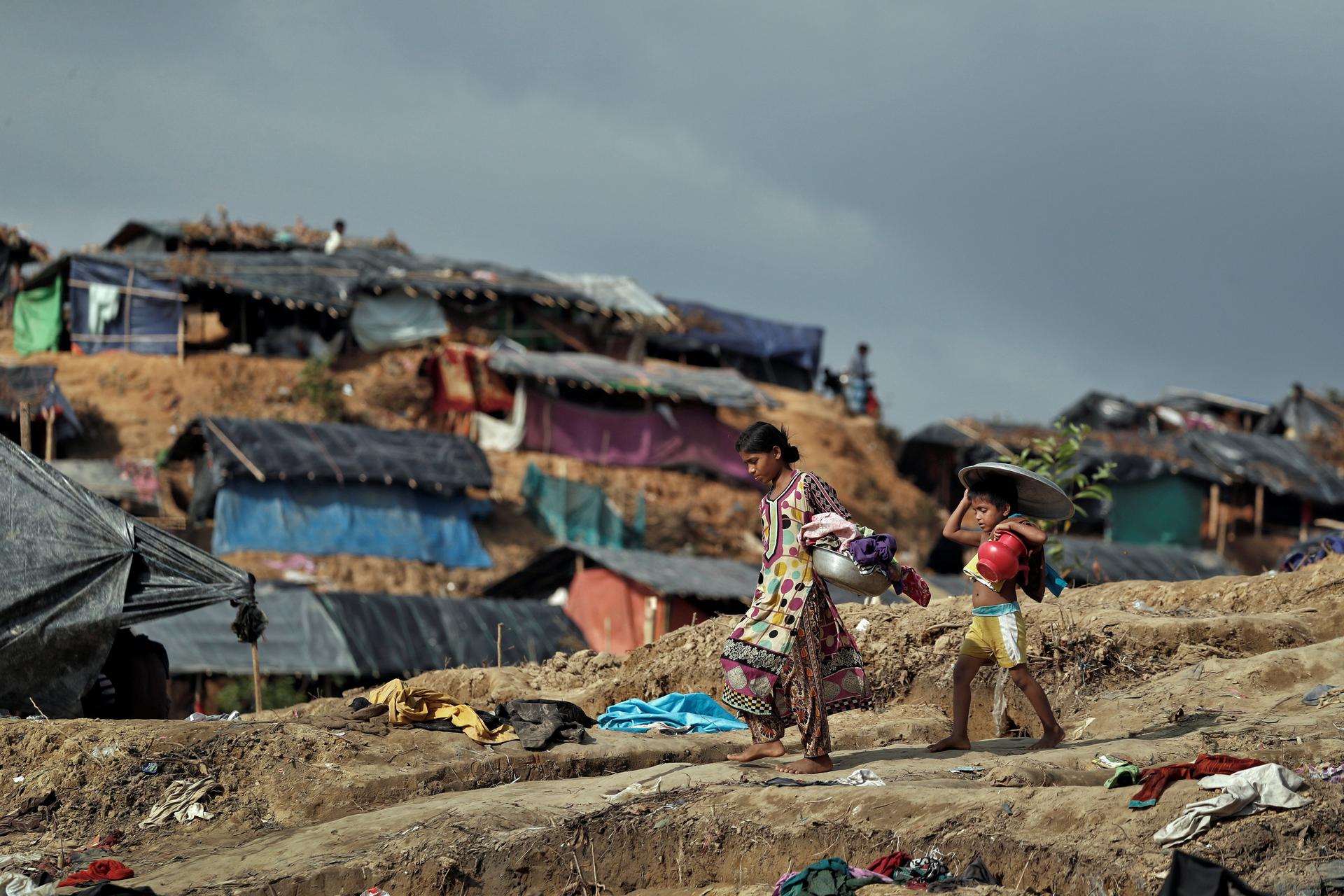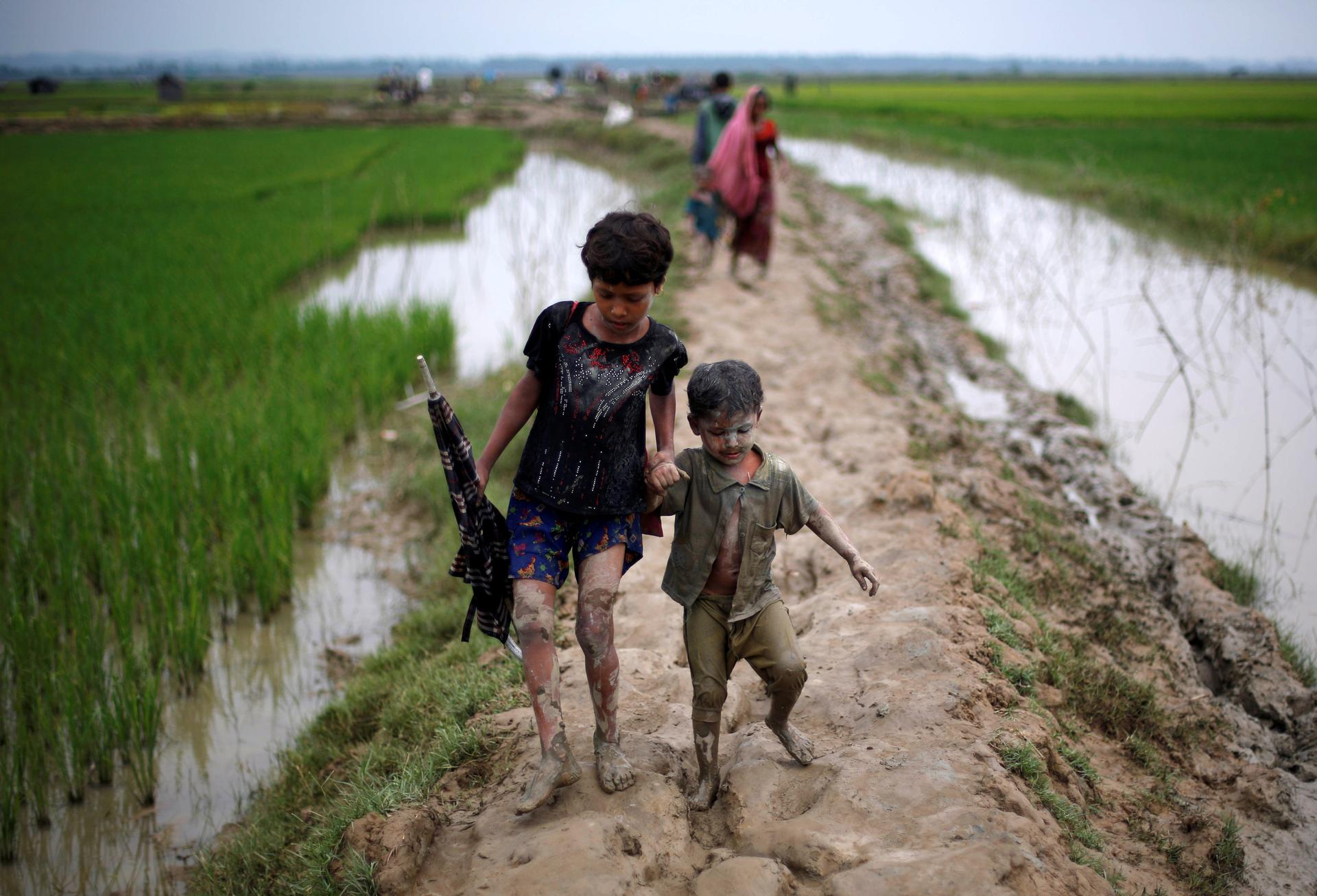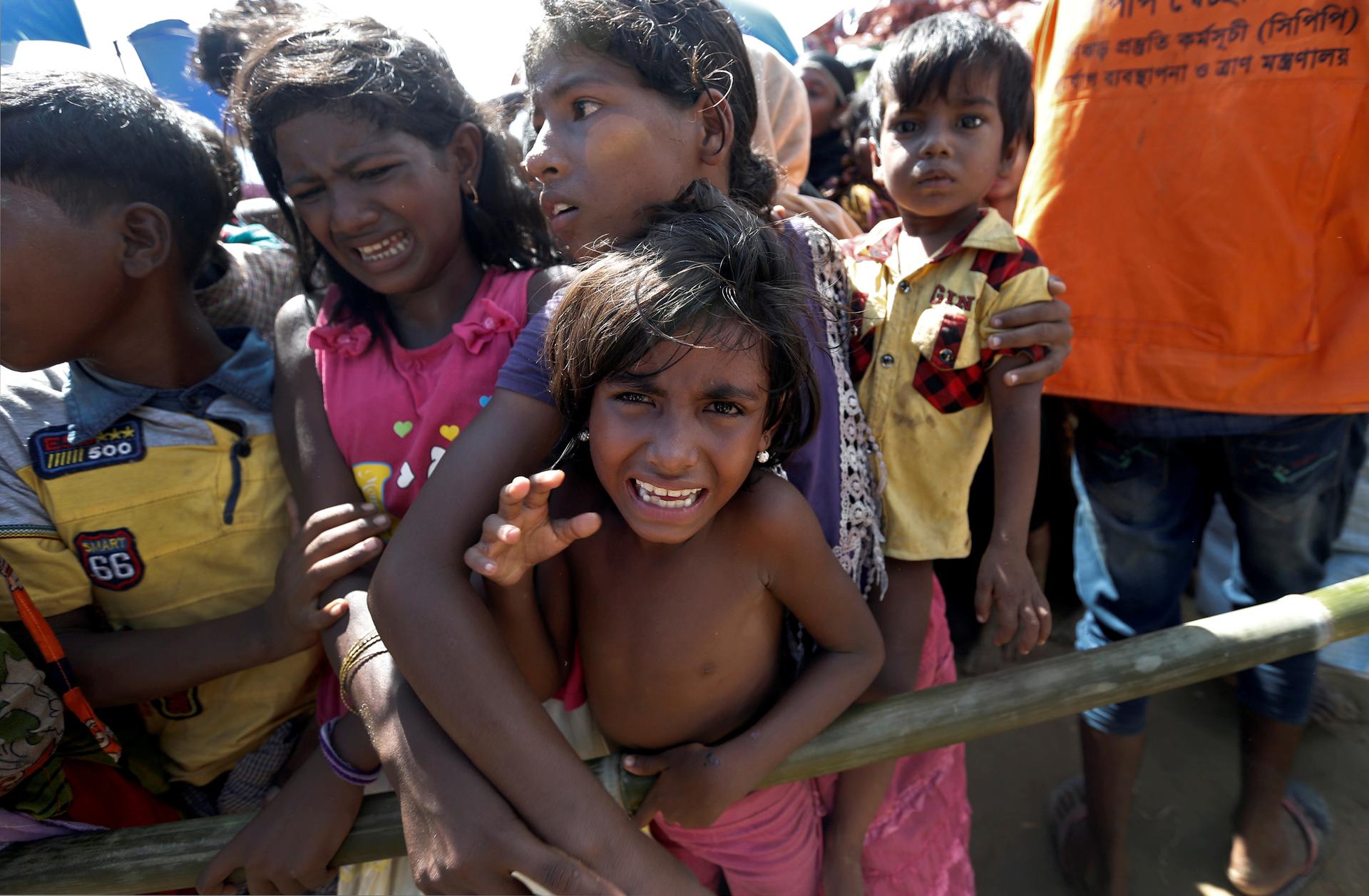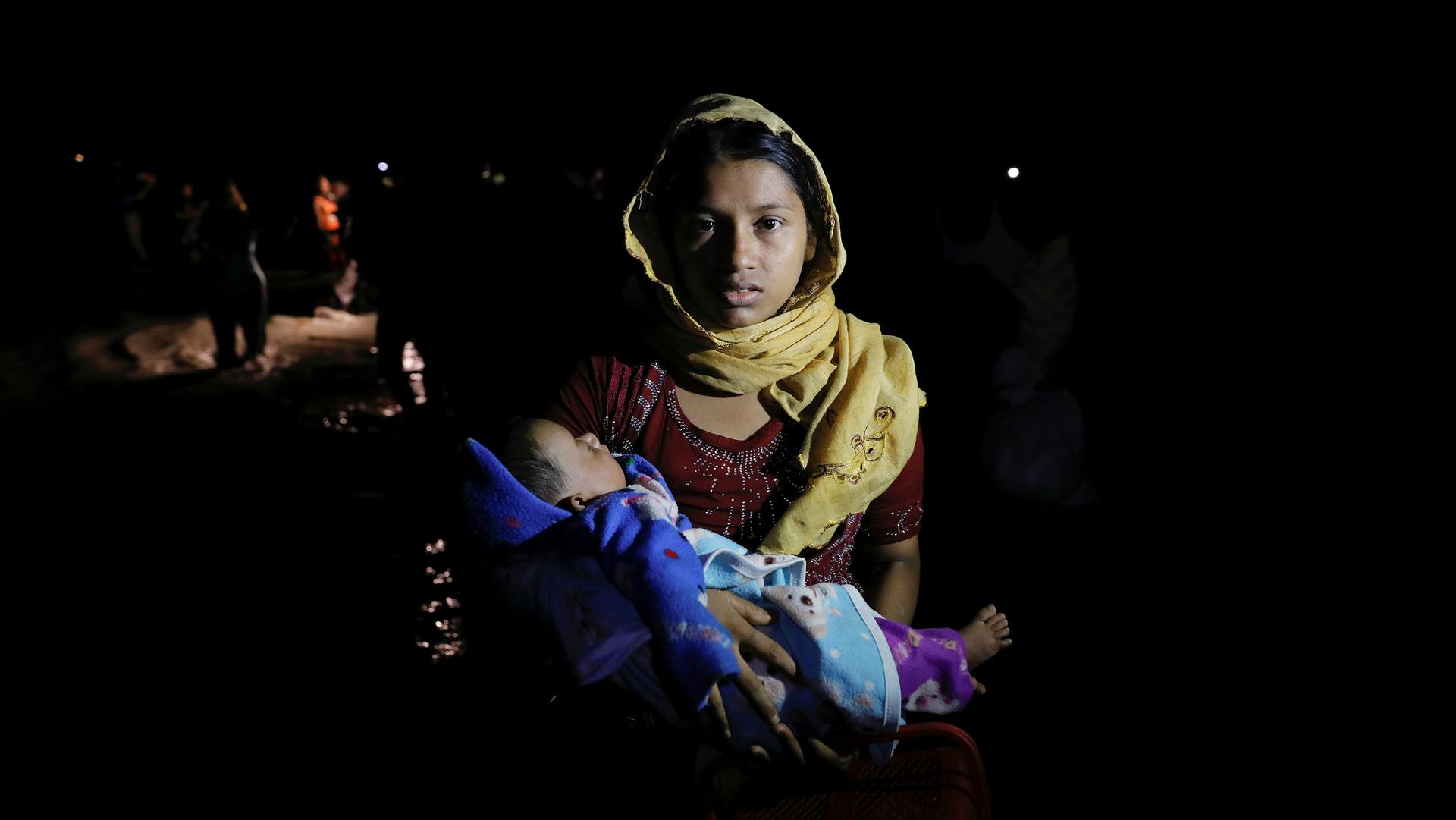More than half of Rohingya refugees in Bangladesh are kids. Many are fleeing Myanmar alone.
Rohingya refugees arrive under the cover of darkness by wooden boats from Myanmar to the shore of Shah Porir Dwip, in Teknaf, near Cox's Bazar in Bangladesh, Sept. 27, 2017.
For a 7-year old, Mohammad Sohail is unusually quiet. He’s startled by the smallest sounds and rarely smiles. He clutches the hand of 18-year-old Jahangir Khan as the two make their way through the muddy and cramped alleys of the Kutupalong Refugee Camp in the southern Bangladesh district of Cox Bazar.
“I first saw him outside a local school where many child refugees are living about three weeks ago," recalled Khan, a Rohingya refugee who was born in Kutupalong camp after his family fled Myanmar’s Rakhine State in the late 1970s. "His clothes were wet; he was shivering, and he looked lost. He looked like an orphan.”
He essentially was.
There are more than 800,000 Rohingya refugees living in Bangladesh. About 480,000 have fled Rakhine since Aug. 25, when Myanmar’s army began an operation against the Muslim minority group in retaliation for an attack by an armed Rohingya faction called the Arakan Rohingya Salvation Army.
The operation has emptied dozens of villages and forced people to flee the violence across Myanmar's borders.
Sixty percent of these new refugees are children below the age of 18, according to UNICEF. And many of them like Mohammad — cold, scared, traumatized — are making the journey alone.
As of Sept. 20, UNICEF and other humanitarian organizations have identified as many as 1,400 unaccompanied children who crossed the border alone — without their parents or any other relatives. It’s likely that this number vastly underestimates the real amount, aid workers say.

“The first thing you notice in any Rohingya refugee camp is just the sheer number of children — they are weak and hungry and have not slept for days," said Christophe Boulierac, a UNICEF spokesperson, while tending to hundreds of children at a child-friendly center set up by UNICEF in the Kutupalong camp. "Many are sick after the long and challenging journey. They are traumatized.”
Mohammad, slowly, began to open up to his new friend. That breakthrough came soon after Khan and his sister, Ayesha Begum, 27, took the little boy home. They cared for Mohammad around the clock — feeding him, clothing him, soothing him. It took three days before the little boy warmed up to Begum and they unraveled his story.
Mohammad does not remember the date he left home or the name of the village in Rakhine he is from. All he remembers is that one morning, soldiers from Myanmar’s military stormed into his village while he was brushing his teeth.
“They shot mummy, daddy, my grandmother, and my friend, Shamshu, and his grandmother,” he said quietly, before turning away with tears in his eyes.
Mohammad ran as fast as he could. He does not remember for how long he was running before he fell into a river.
“There was a very big leaf in the river, and I caught it, held onto it and floated for a little while,” he recalled.
Eventually, another group of fleeing Rohingya villagers grabbed the little boy, and he began following them. He estimates that he walked in hills and forests for six days before finally arriving at the Naf River.
A boatman agreed to ferry him across the river to Bangladesh for free. From there, he walked again for about two days with another group of refugees who brought him to the school in front of Khan’s house.
“He was sick, and he had [a] high fever,” Begum said. “I took him to the doctor and got him some medicines."
"He came just with the clothes he was wearing and nothing else," she added, holding up bright blue and pink T-shirts. "So, today, I went to the market and bought these new clothes for him.”

Nearby, at the camp, Boulierac worries over the children there.
UNICEF has set up about 40 child-friendly spaces where children can play and relax. Some of these centers are mobile and move around the camp so that aid workers can more quickly and easily identify children who are unaccompanied or lost.
Even so, these camps are hard places to be a kid. With the near constant rain, Kutupalong and other makeshift camps in the region have transformed into giant pools of mud. With a basic lack of infrastructure like toilets, hygiene is a big concern. Children play in the dirt, and aid workers and Bangladesh officials are very concerned about how vulnerable they are to diseases like cholera.
“This is an unprecedented humanitarian crisis, and children are at an incredible risk here," Boulierac said, adding that there are other concerns. Unaccompanied children are at particular risk of abuse.
“They are vulnerable to child trafficking, child marriage and child labor and will need psychological support and protection,” he said.
Boulierac says that he is so shocked by some of the cases he is seeing that it reminds him of what he witnessed during the Rwandan genocide in 1994. “Some of those children are still receiving counseling as adults, and I won’t be surprised if that’s the case here, too,” he said.

Twelve-year-old Khadija Jannat sits in a corner at the center staring listlessly at other children. Next to her, her 8-year-old sister plays with crayons. A UNICEF teacher tries to get Jannat to join the other children who are playing a singing game, but she declines.
Faria Selima, an employee with UNICEF in Bangladesh, said Jannat and her sister saw their parents and six siblings killed in front of them by a large mob of people that included some soldiers in military uniform. They managed to escape and, just like Mohammad, joined another group of fleeing Rohingya to get to Bangladesh.
Jannat has not yet spoken about her experience.
The worrying news is that the number of child refugees is likely to grow. “I don’t want to speculate, but the fact is that even now there is an influx of child refugees. We are scaling up our operations in order to meet the massive needs of the people who are already here,” Boulierac said.
Meanwhile, more than 70,000 Rohingya women in the camps have recently given birth or are pregnant, according to the Bangladesh government. More than 400 children were born on the road or in the jungles as their parents fled from Myanmar.
The question now is what comes next for unaccompanied young refugees. For the moment, some like Jannat and her sister live with other Rohingya families in the camp. Aid workers say reuniting children with family is key.
“Our efforts, along with Bangladeshi authorities, will be to attempt to identify if any of the parents of the unaccompanied children are still alive. If they are, we will try to reunite them with their families, otherwise, they will be placed in foster care,” Boulierac said.
Meanwhile, Khan and Begum have all but adopted Mohammad.
“I will keep him,” Begum said while giving medicine to Mohammad, who is still recovering from his long journey. "He has no parents, and he is a Muslim boy, so it is my duty to look after him. I will adopt him."
Mandakini Gahlot reported from Cox’s Bazar, Bangladesh.
Our coverage reaches millions each week, but only a small fraction of listeners contribute to sustain our program. We still need 224 more people to donate $100 or $10/monthly to unlock our $67,000 match. Will you help us get there today?
